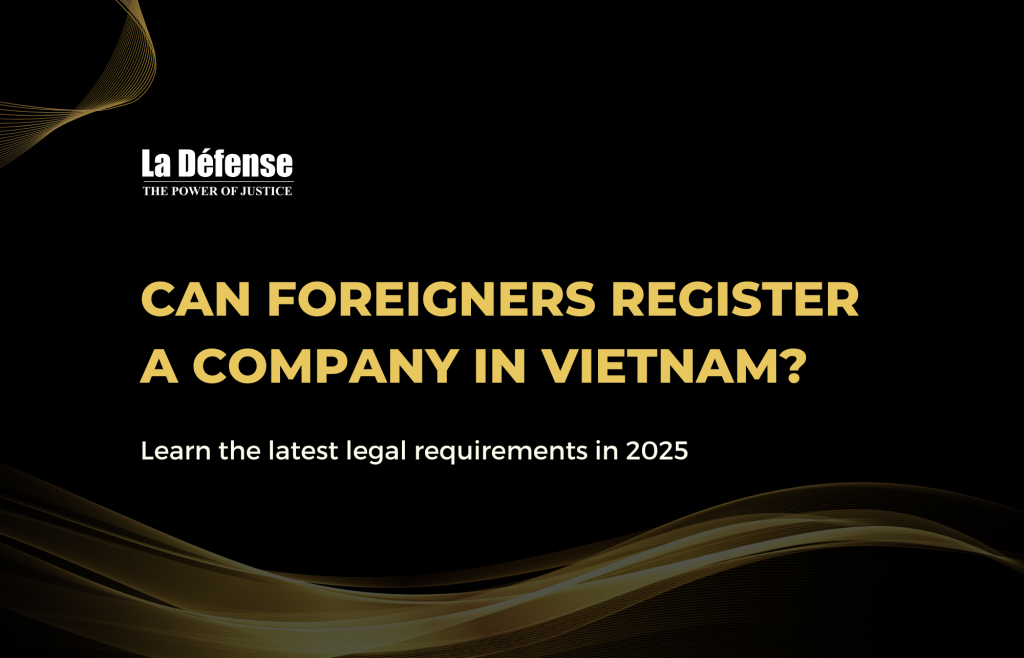Hey there, global go-getter! Dreaming of setting up shop in Vietnam’s buzzing market? Maybe you’ve heard it’s a hotspot for foreign investment—low costs, skilled workers, and a growing economy. But how can foreigners register a company in Vietnam? At La Défense, we’ve helped tons of international clients make it happen, and the answer is a resounding yes! With the latest laws in 2025, it’s more open than ever—but there are steps to follow. Let’s break it down so you can get started with confidence.

Yes, Foreigners Can—And It’s Encouraged!
Vietnam’s doors are wide open to foreign investors, thanks to the Law on Enterprises 2020 and the Law on Investment 2020 (both kicking in strong as of 2025). You don’t need to be a Vietnamese citizen or live here to register a company. Whether you’re from the US, Europe, or Asia, you can set up a 100% foreign-owned business—or team up with locals if you prefer. The government actively welcomes you, especially in sectors like tech, manufacturing, and trade. So, what’s the process?
Step 1: Choose Your Company Type
You’ve got options—Vietnam’s laws let foreigners pick from these common setups:
– Limited Liability Company (LLC): Most popular—think single-member (just you) or multi-member (up to 50 partners). Liability’s capped at what you invest.
– Joint Stock Company (JSC): Great for bigger plans—issue shares, minimum 3 shareholders, no upper limit.
– Partnership: Rare, but an option if you’re pooling resources with others.
LLCs are the go-to for foreigners—flexible and straightforward. No company yet? No problem—you can register as an individual investor first.
Step 2: Check the Rules (They’re Looser Now!)
Vietnam’s Law on Investment 2020 eased up on restrictions. Most industries—like IT, retail, or education—allow 100% foreign ownership. But some “conditional” sectors (e.g., telecom, banking, or tourism) might cap your stake or require a local partner. As of 2025, the negative list (Appendix I, Decree 31/2021/ND-CP) still flags these limits, but it’s shorter than ever—good news for you! Unsure about your industry? La Défense can check the fine print for you.
Step 3: Get Your Investment Registration Certificate (IRC)
First big step: the IRC from the Department of Planning and Investment (DPI). It’s your green light as a foreign investor. You’ll need:
– Investment Proposal: Outline your business—goals, location, capital (no strict minimum, but it’s assessed for feasibility).
– Legal Docs: Passport (individuals) or company certificate (if you’re a business), legalized and translated into Vietnamese.
– Proof of Funds: Bank statements or financial guarantees—show you can back your plan.
Submit online via the National Investment Portal. Processing takes 15–30 days, unless your sector needs higher approval (e.g., a People’s Committee sign-off for big projects). We at La Défense streamline this for you—no delays, no guesswork.
Step 4: Grab Your Enterprise Registration Certificate (ERC)
Next, the ERC makes your company official. File with the DPI’s Business Registration Office:
– Application Form: Name, address, legal rep (more on that soon).
– Company Charter: Your rules—capital, structure, etc.
– IRC Copy: Proof you’re legit.
Takes about 3–5 days—super quick! Your business name must be unique (check the National Portal first) and include “LLC” or “JSC” in Vietnamese (e.g., “Công ty TNHH”). Post-ERC, you’ll get a tax code and seal—key for operations.
Step 5: Post-Setup Must-Dos
You’re in! Now:
– Open a Bank Account: A capital account for your investment—funds must arrive within 90 days of ERC issuance.
– Appoint a Legal Rep: At least one must live in Vietnam (can be you or a local hire). They sign docs and represent you legally.
– Licenses: Some sectors (e.g., food or pharma) need extra permits—post-registration but pre-operation.
All docs in English? They’ll need notarized Vietnamese translations—part of the 2025 rules.
Foreign-Friendly Updates in 2025
The Law on Enterprises 2020 simplified things:
– No Minimum Capital: Except in regulated fields (e.g., real estate or finance), DPI just checks if your capital fits your plan—flexible!
– Online Filing: The National Business Registration Portal’s smoother than ever—less paperwork, faster approvals.
– Fewer Restrictions: More sectors opened up since Decree 31/2021/ND-CP refined the “no-go” list.
Vietnam’s WTO commitments and FTAs (like EVFTA) also boost your rights—think priority if you’ve filed at home within 6 months (Paris Convention perk).
Challenges? We’ve Got You
– Legal Rep Rule: Need someone in-country? We can advise or connect you.
– Conditional Sectors: Caps or joint ventures tripping you up? We’ll navigate it.
– Timeline: IRC + ERC takes 1–2 months—longer if complex. La Défense cuts the red tape.
Why Do It?
Registering in Vietnam gives you:
– A foothold in a 100-million-strong market.
– Protection from copycats—your brand’s safe.
– Access to tax breaks and incentives (check industrial zones!).
It’s strategic—Vietnam’s a manufacturing hub and e-commerce boomtown in 2025.
Ready to Roll?
Can foreigners register a company in Vietnam? Absolutely—under the latest 2025 laws, it’s easier and more open than ever. Start with an IRC, grab your ERC, and you’re set—costs kick off at minimum for basic fees, plus your capital. At La Défense, we’ve got the know-how to make it smooth, whether you’re in Hanoi or halfway around the world. Don’t wait—contact us today, and let’s turn your Vietnam vision into reality. Your company’s future starts here!
Read more:
- How to Set Up a Singapore Company in Vietnam 2025
- How to Set Up a Japanese Company in Vietnam 2025
- How to Set Up a Korean Company in Vietnam 2025

